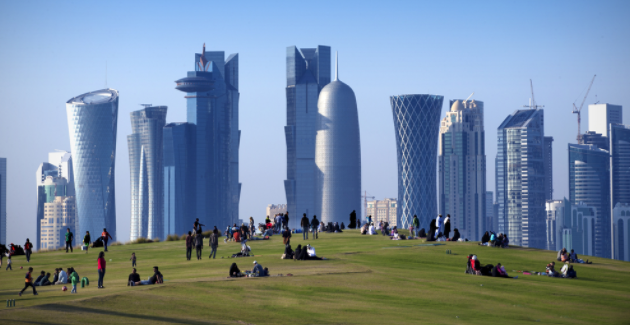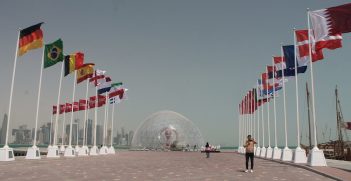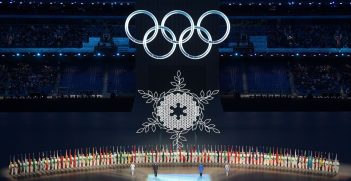The Roots of the Qatar-Saudi Arabia Dispute

Saudi Arabia and several neighbours have imposed heavy economic sanctions on Qatar over its alleged support for extremist groups. Even if a short-term solution is found to the dispute, it is unlikely to address the longer-term issues being exposed.
Qatar, a tiny emirate with a population of around 300,000 citizens plus more than two million foreign workers, has long been disputed among its neighbours. Since independence in 1971, it has felt threatened and vulnerable; its efforts to consolidate its independence have made it the problem child in the family of Gulf sheikhdoms.
In 1995, Qatar’s Sheikh Hamed bin Khalifa broke Gulf rules and overthrew his father. He proceeded to modernise the emirate in order to consolidate his family’s control. Sheikh Hamed also set out to strike an independent path for Qatar in the region. This involved competing with Saudi Arabia and engaging Iran; Qatar and Iran share the massive South Pars/North Dome gas field.
Both Qatar and Saudi Arabia follow the Wahhabi interpretation of Sunni Islam. The Saudis have promoted Wahhabism around the Muslim world in an attempt to establish their dominance over Sunni Islam; many problems in the Muslim world stem from this ambition.
In contrast, the Qataris have pursued more pragmatic approaches, such as allowing the United States to establish a major air force base in Al-Udeid and maintaining close relationships with some Islamist groups, especially the Muslim Brotherhood. They have also pursued soft power policies, including the establishment of the Al-Jazeera network and acquiring the right to host the 2022 World Cup.
Arab revolts
Numerous spats aside, Qatar’s relations with its neighbours were relatively stable and businesslike until the Arab revolts of 2011. The revolts shook every regime in the region and initiated a more aggressive form of competition. This is particularly apparent in Libya and Syria, where the Saudis, Kuwaitis, Turks and Qataris have actively supported competing extremist groups. For the Saudis to accuse Qatar of funding terrorism is a case of the pot calling the kettle black.
Equally important in the current dispute are Qatar’s relations with the Muslim Brotherhood and Iran. The Qataris seem to have decided that the widely popular Muslim Brotherhood represent the future of Arab politics. They have supported the brotherhood’s regional groups, including Hamas in Palestine, thereby incurring Israeli enmity, and, following the removal of Mubarak in Egypt, the Muslim Brotherhood government of Mohammed Morsi. After the 2013 Egyptian coup led by General Al-Sisi, Qatar continued to support the Muslim Brotherhood and provided sanctuary to Yusuf Al-Qaradawi, a significant Egyptian scholar with ties to the group, who has recently been placed on a Saudi-UAE terror list. This is a major factor behind Egypt’s decision to join the Saudis’ alliance against Qatar.
Iran: the auld enemy
Behind the increasingly aggressive approach taken by the Saudis in this dispute has been the emerging presence of Iran. Since the 2014 nuclear agreement between Iran and six major powers, Iran has begun to break free from decades of economic sanctions and presents a major challenge to the small Arab states of the Gulf. Iran’s re-emergence exposes the flaws in Saudi Arabia’s pretensions to regional leadership.
Nevertheless, Saudia Arabia was emboldened in its desire to reverse the gains made by Iran by the recent visit to Riyadh of US President Donald Trump and is building on apparent US support to develop an anti-Iran coalition. The Saudi foreign minister’s suggestion that Iran needed to be punished, preceding a terrorist attack in Tehran that Iran blames on Saudia Arabia, highlighted the deteriorating atmosphere across the region.
Qatar’s less than enthusiastic endorsement of policies to isolate Iran has led the Saudis to the point where some analysts are predicting an attempted Saudi-inspired coup against Qatar’s ruler, Sheikh Khaled bin Khalifa.
Heading in dangerous directions
The potential consequences of such obduracy on the part of Saudi Arabia are considerable. A major casualty is Trump’s coalition against Islamist extremism that he announced during his Saudi trip. That coalition is in tatters.
Meanwhile, other governments are beginning to take sides in the dispute. Pakistan and Bangladesh, for example, are heavily dependent on the remittances they get from their workers in Gulf countries; they have, therefore, sided with the Saudis. Tunisia, on the other hand, has rejected attempts to isolate Qatar. Turkey, Iran and Oman have moved to break the blockade that the Saudis have imposed on Qatar. Turkey, together with Iran, has provided food and water to the emirate, and Turkish troops are reported to have been deployed there. After reservations, Russia has begun to move to support the Qataris.
The US administration finds itself caught in a dilemma. Notwithstanding Trump’s boasting of his role in the targeting of Qatar, the US needs the base at Al-Udeid and cannot afford to allow the blockade to continue or to alienate the regime in Qatar.
The world is faced with a situation of increasing seriousness, in which the stakes are high for all parties. Urgent steps are needed to prevent the confrontation from escalating to violence.
There are no angels in the dispute, but it is in the interests of the international community for Saudi Arabia to back off, just as it is in the longer-term interest for Saudi support for extremism to be curtailed. The solution to the destruction in Syria requires, among other things, all the Gulf states to end their support for extremists. The growing radicalisation of Muslim communities in Indonesia, Malaysia and Nigeria similarly depends on the stifling of Saudi ambitions.
A lasting solution will require measures to give Gulf states a greater sense of security. This will require a security structure that can help states deal with their problems through diplomacy rather than force. Such a structure will need the involvement of major powers, including Iran and Turkey, as well as Russia and the US.
Dr Anthony Billingsley is a lecturer of international relations at the School of Social Sciences, Faculty of Arts and Social Sciences, University of New South Wales.
This article is published under a Creative Commons Licence and may be republished with attribution.





